Editorial
Fasting criminals
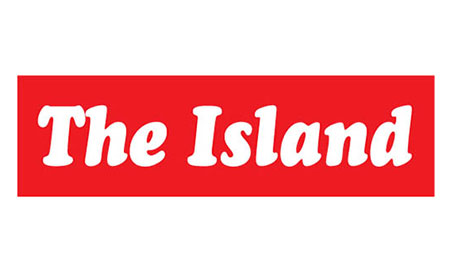
Monday 14th September, 2020
Most of the underworld figures who launched a fast, in the Boossa High Security Prison, recently, have given up the protest, according to media reports. The hunger strike is against the communication restrictions currently in place, and security checks on visitors, among other things. These criminals have only themselves to blame for this situation; they have been found to be running their illegal operations such as drug running, extortion and contract killing via mobile phones from their cells. They are lucky that they are not living in a country like Saudi Arabia, where the crimes they have committed carry medieval punishments such as beheading or amputations.
In the civilised world, prisoners have their rights, which must be respected, but the criminals like the ones on a fast in the Boossa prison should be allowed to realise what it is like to go hungry because hundreds of families whose breadwinners they have murdered are struggling to dull the pangs of hunger.
Among those being held in the Boossa prison are many dangerous criminals such as Kudu Naufer, who had an upright judge killed, Wele Suda, Kosgoda Tharaka, Bloemendhal Sanka, Kanchipani Imran, Ganemulla Sanjeewa, Army Sampath, Dematagoda Chaminda, Podi Lassie and Pitigala Kewma. As we pointed out in a previous comment, their private armies are at large and have among them highly trained, trigger-happy military deserters. , a few weeks ago, bluntly told a group of prison officers that his men had enough weapons and were capable of killing anyone at will. He also issued veiled threats to Defence Secretary Kamal Gunaratne and President Gotabaya Rajapaksa, according to what one gathers from media reports. He has said he is above the police, and the prison officers had to do as he said. Pitigala Kewma and Podi Lassie also turned aggressive and threatened the prison officers, we are told. Ordinary people have no protection against these Napoleons of Crime.
The criminals behind bars are not bellowing empty rhetoric. They mean what they say. They are capable of carrying out their threats. They may even be having links to international crime syndicates and/or terrorist groups engaged in drug smuggling and gun running. It was recently revealed that a huge stock of illegal weapons, numbering well over 100 had been brought to Colombo from Naula in Matale. Most of these weapons including assault rifles and RPG launchers are believed to have been delivered to underworld characters. Only twelve assault rifles of this stock were seized from one of Kosgoda Tharaka’s armouries.
The need for hunting down the criminal gangs that threaten even the Defence Secretary and the Commander-in-Chief cannot be overemphasised. They have emerged so strong thanks to some venal law enforcement officers, politicians and prison officers who facilitate their communication with the underworld from prison. A journalist was also arrested recently for transporting the aforesaid stock of weapons. The underworld has infiltrated all vital sectors, and Defence Secretary Gunaratne got it right when he told a group of police officers recently that the police and the prisons had to be rid of corrupt elements colluding with criminals. He took the OICs of some police stations to task for their failure to arrest criminals and seize illegal weapons in their areas. If they carried out their duties and functions properly there was no need for special police teams to be dispatched from Colombo to arrest criminals in their police areas, Gunaratne said. One cannot but agree with him that extortionists have not spared even poor traders at village fairs. The OICs who do not care to bring criminal elements must be made to face disciplinary action and punished if found guilty.
If the government takes on the underworld with might and main and wipes out powerful gangs, the criminals in prison will have to fall in line and partake of their meals. The hubris of these savages makes even those who oppose the death penalty wonder if their ethical concerns are misplaced.
Editorial
‘Political prisoners’

Tuesday 12th November, 2024
Another round of promise making has come to an end with two days to go before the next general election. Perhaps, the only thing Sri Lankan politicians do ‘as if to the manner born’ is to make promises to win elections, which have become promise-making contests in this country. If Machiavelli were alive, Sri Lankan politicians’ adeptness at making promises and breaking them would compel him to put out a revised edition of ‘The Prince’. The Opposition politicians are making new promises while President Anura Kumara Dissanayake and his team are promising to fulfil their election promises and making still more pledges.
It is only natural that all political parties in the parliamentary election fray are desperate and troubled by a gnawing sense of uncertainty. Elections held under the Proportional Representation (PR) system can throw up surprises. Given the electoral strengths or weaknesses of the parties in contest, and the way seats are allocated under the PR system, the prospect of a hung parliament is looming large and has left political parties and their leaders scrambling for alliances.
The JVP-led NPP did not succeed in getting off to a flying start after winning the presidency in September much to the disappointment of those who expected quick results. Sri Lankans are in a mighty hurry; they cannot even wait until traffic lights turn green! The NPP elevated the people’s expectations immeasurably, before the presidential election, promising many things including huge fuel price reductions and making other essential commodities freely available at affordable prices. Above all, its failure to win the presidency outright, despite its claim that it was riding a massive wave of popular support, has apparently affected its parliamentary election campaign, which has seen a drop in voter enthusiasm.
President Dissanayake, who stumped for the NPP throughout the country during the past several weeks, renewed a controversial promise in Vavuniya over the weekend. He pledged to release the ‘Tamil political prisoners’ in consultation with the Attorney General (AG). The Tamil Guardian has reported that JVP/NPP stalwart Bimal Ratnayake said in Vavuniya last month that President Dissanayake was “committed to releasing all political prisoners”.
Interestingly, successive governments including the Yahapalana administration, which Dissanayake’s JVP backed to the hilt, have insisted that there are no political prisoners. In 2015, Yahapalana Justice Minister Dr. Wijeyadasa Rajapakshe declared that Sri Lanka did not have any political prisoners. He said there were only some LTTE suspects in detention. The JVP did not take exception to his claim. Rajapakshe has reiterated his position on the issue, according to our main news item today. In 2021, Justice Minister Ali Sabry, in response to an inquiry ITAK MP Shanakiyan Rajaputhiran Rasamanickam made in Parliament about the total number of ‘political prisoners’ in Sri Lanka, denied that there was anyone in prison for political reasons. He said 12,848 LTTE members had been rehabilitated and released after the end of the war in 2009 and that 600 of them were child soldiers. He said some persons were being held in connection with ongoing legal procedures, which were time-consuming due to the complex nature of the cases. He said the government would expedite those cases with the help of the AG. The then SJB MP Mano Ganeshan accused the government of playing on nomenclature to evade the question of political prisoners, and called for the release of all those who were being held under the Prevention of Terrorism Act. The NPP reportedly stayed aloof from the debate on ‘political prisoners’ at the time.
What President Dissanayake, who is also the Minister of Defence, has said about ‘Tamil political prisoners’ is likely to be considered official, and his pledge to release them has already been picked up by the international media and human rights groups. So, it is incumbent upon the President to substantiate his claim in question by revealing the number of ‘political prisoners’ in Sri Lanka, if any. It is antithetical to democracy to hold political prisoners. Has the government mistaken some hardcore LTTE cadres for ‘political prisoners’? An explanation is called for.
Editorial
Corpse-driven politics

Monday 11th November, 2024
Almost all extrajudicial killings have remained unsolved in this country because they have been reduced to mere political slogans. During election campaigns, politicians gain a great deal of political mileage by shedding copious tears for the victims of barbaric violence and promising to ensure that justice is served, but they forget their promises after winning elections and being ensconced in power. This is the name of the game in Sri Lankan politics.
Genghis Khan (1162-1227) became the first warrior to weaponise corpses, as it were. He laid siege to enemy fortresses and catapulted rotting corpses into them thereby causing diseases to spread there. Sri Lankan politicians have mastered the art of politicising corpses to win elections.
It may be recalled that the UNP used the tragic death of a young woman, named Premawathie Manamperi, at the hands of some savages in uniform during the 1971 JVP insurgency to drum up popular support to win the 1977 general election, but 10 years later, it set in motion its ‘Caravan of Death’, which left streets strewn with the corpses of tens of thousands of JVP activists and suspects. In 1994, Chandrika Bandaranaike Kumaratunga engineered a regime change by promising to eliminate state terror and corruption, but her government came to be characterised by rampant corruption and extrajudicial killings. In 2015, Maithripala Sirisena, backed by the UNP and the JVP, became President, promising to usher in good governance and bring to justice those who had committed crimes such as the killings of The Sunday Leader editor Lasantha Wickrematunge and famous rugby player Wasim Thajudeen during the Rajapaksa government. But that promise went unfulfilled, and Sirisena joined forces with the Rajapaksas three years later; Ranil Wickremesinghe, who was the Prime Minister in the Yahapalana government, became President with the help of the Rajapaksas in 2022!
President Anura Kumara Dissanayake, addressing an election rally in Dambulla on Saturday, reportedly vowed to ensure that the killers of Wickrematunge and Thajudeen and those who were responsible for the involuntary disappearance of Pradeep Ekneligoda would be made to face the full force of the law. One cannot but agree with President Dissanayake on the need to expedite such emblematic cases or even launch fresh probes thereinto, if necessary. The killers of Lasantha and Thajudeen and those who made Ekneligoda disappear must not be allowed to go unpunished. The President can rest assured that all right-thinking people will be with him on this score although his pledge in question has come only a few days ahead of a general election and therefore smacks of a political motive.
Besides, high-level probes must be conducted into attacks on media institutions during the Kumaratunga and Rajapaksa administrations.
However, there is something President Dissanayake, who also leads the JVP, has to do to demonstrate his bona fides as a crusader for justice if he is to prevent his critics from casting aspersions on his sincerity. He will have to order a thorough probe into the extrajudicial execution of the founder of his party, Rohana Wijeweera, who was shot and burnt alive while in police custody in 1989.
The JVP’s November Heroes’ Day event, where the slain JVP leader Wijeweera and other party leaders/cadres who perished at the hands of counterterror operatives in the late 1980s are commemorated annually, cannot be held this year in view of the upcoming general election. The JVP offshoot, Frontline Socialist Party (FSP) has accused the JVP-led NPP of having scheduled the parliamentary contest in such a way that the November Heroes’ Day (13 Nov.) falls during the mandatory cooling-off period and the government can avoid the Wijeweera commemoration. What the FSP has chosen to leave unsaid is that the JVP-led NPP has done so because it is wary of doing anything that will evoke the people’s dreadful memories of the killing spree the JVP launched in the late 1980s purportedly to resist ‘Indian expansionism’ and abort the Indo-Lanka Accord and the 13th Amendment (13A). Today, the JVP in the NPP’s clothing has done a volte-face; it has reached a rapprochement with India, denied having conducted an initiation lecture on ‘Indian expansionism’ in the late 1980s, and accepted 13A and devolution of power.
Even the widow of notorious drug dealer Makandure Madush, who became Sri Lanka’s ‘Napoleon of Crime’, has called for a thorough probe into the killing of her husband in police custody in 2020. She has sought to dispute the claim that he was killed by a rival gang. It defies comprehension why the JVP has not launched a campaign, seeking justice for its beloved founder. Has it forgotten Wijeweera?
Editorial
The return of Trump

Readers who had the opportunity of watching the YouTube report of the concession speech of Kamala Harris, defeated by Donald Trump at the Nov. 5 U.S. Presidential election, would have been treated to an exceptional performance by an exceptional woman, her voice hoarse from the whirlwind 13-week campaign during which she sought what is arguably the world’s most powerful job. Immaculately dressed and groomed as she always was during her term as Vice President to Joe Biden as well as during the campaign, she delivered a rousing speech at her Washington alma mater, Howard University, that moved many listeners, particularly young people to tears. She declared: “While I concede this election, I do not concede the fight that fueled this campaign. Hear me when I say the lights of America’s promise will always burn bright, as long as we never give up.”
Commentators and pollsters using the most advanced technology available were unanimous that the race was too tight to call. But they were terribly wrong though the authoritative The Economist has ex post facto pronounced Trump’s victory “no fluke.” Dead heat was the common prediction as the first Tuesday in November, four years after the last U.S. presidential election when Joe Biden defeated Trump decisively, approached. The American constitution mandates the holding of a presidential election on the first Tuesday in November every four years, an ironclad requirement. Both contenders had loyal, sometimes fanatical support with the liberal establishment and many more strongly backing Harris while the super rich led by billionaire Elon Musk threw their weight behind Trump. The winner also drew the support of those labeled “white supremacists” while the loser had to contend with the negative economic effect during the early years of the Biden administration not yet overcome.
Trump narrowly escaped death when a gunshot fired by a sniper from a rooftop grazed his right ear during the election campaign. The gunman was shot dead but the head of the U.S. Secret Service, Kimberly Cheatle, was forced to resign admitting a massive security failure. A second attempt some weeks later at a Florida golf course where Trump was playing was aborted with no damage done. The dangerously close shooting incident which united Trump’s supporters was effectively used by his campaign to maximum effect.
Trump won the election with a comfortable majority in the Electoral College as well as on the popular vote. This was unlike 2016 when he defeated Hillary Clinton in the Electoral College while losing the popular vote, something that had happened only once before in recent times (Al Gore vs. George. W. Bush in 2000). But it was different this time round and Trump’s victory at both the Electoral College and on the popular vote was convincing despite the heavy artillery he had to fight. These included dozens of indictments and a conviction in the courts for which he awaits sentence, two impeachment resolutions and barrels of sleaze flung at him. His rambling unfocused style of speech, ‘I know best’ attitude and vulgarity were all factors that weighed heavily against him. Despite Harris’ good looks and attractive demeanor, oratorical skills and much more, plus the wide endorsement of liberal America, she was roundly defeated by a rival strongly opposed by much of the American media with the exception of Fox News that threw considerable weight behind the Trump campaign.
The Democrats may have paid a price for Harris’ late entry to the race. Despite strident demands by his party and friends to stand down, the 81-year old Biden insisted on seeking re-election with Vice-President Kamala Harris as his running mate. As senator from California, Harris herself had sought the Democratic ticket for 2020 but stood down citing lack of funds. Candidate Biden named her his running mate and carried that election. But with the 2024 campaign taking off, Biden who would have been 85-years old at the end of a second term, was forced to stand down as his cognitive degeneration became increasingly visible even during a debate with his rival Donald Trump. Thus Kamala Harris, without the benefit of a primary of the Democratic Party, became its candidate for the just concluded election.
Harris scored brownie points in her concession speech saying that there will be a peaceful transition unlike four years ago when Trump, claiming that the election was “stolen” had his supporters march on Capitol Hill. His own Vice-President Mike Pence refused to be bludgeoned by his boss to refuse to certify the 2020 election result. In contrast, Harris as incumbent President of the Senate will certify these results in January enabling Donald Trump’s return to the White House. His election will affect people globally, wherever they may live. The Economist has called Trump “the most consequential American president since Frankly. D. Roosevelt.” How the self-proclaimed anti-war president will handle global conflicts in Ukraine and the Middle East are questions that hang tantalizingly over the whole world.
-
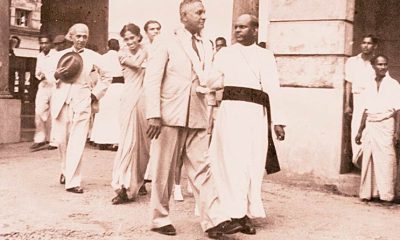
 Features3 days ago
Features3 days agoWhen Sir John Kotelawala visited St. Joseph’s College
-

 Sports7 days ago
Sports7 days agoHow Sri Lanka stunned everyone in the Hong Kong Sixes
-

 Features7 days ago
Features7 days agoA call from university teachers for a commitment to free education
-
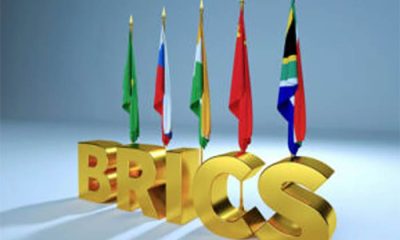
 News3 days ago
News3 days agoSL will not be able to join BRICS right now but membership of its NDB bank okayed
-
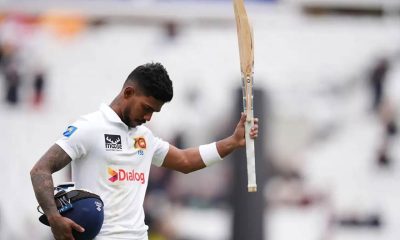
 Sports3 days ago
Sports3 days agoPathum Nissanka; the ace up Sri Lanka’s sleeve
-
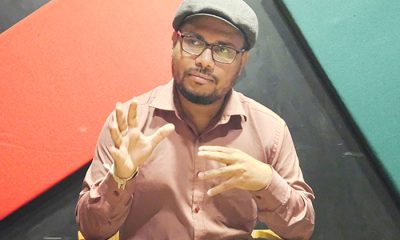
 News7 days ago
News7 days agoWijeweera’s son warns the danger of giving NPP 2/3rd majority
-

 Editorial7 days ago
Editorial7 days agoCPC skirts main issue
-
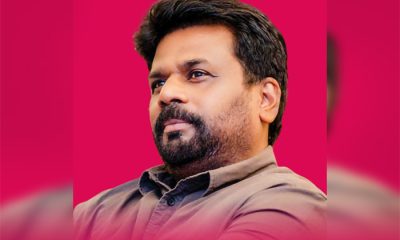
 Opinion6 days ago
Opinion6 days agoA new dawn for Sri Lanka











